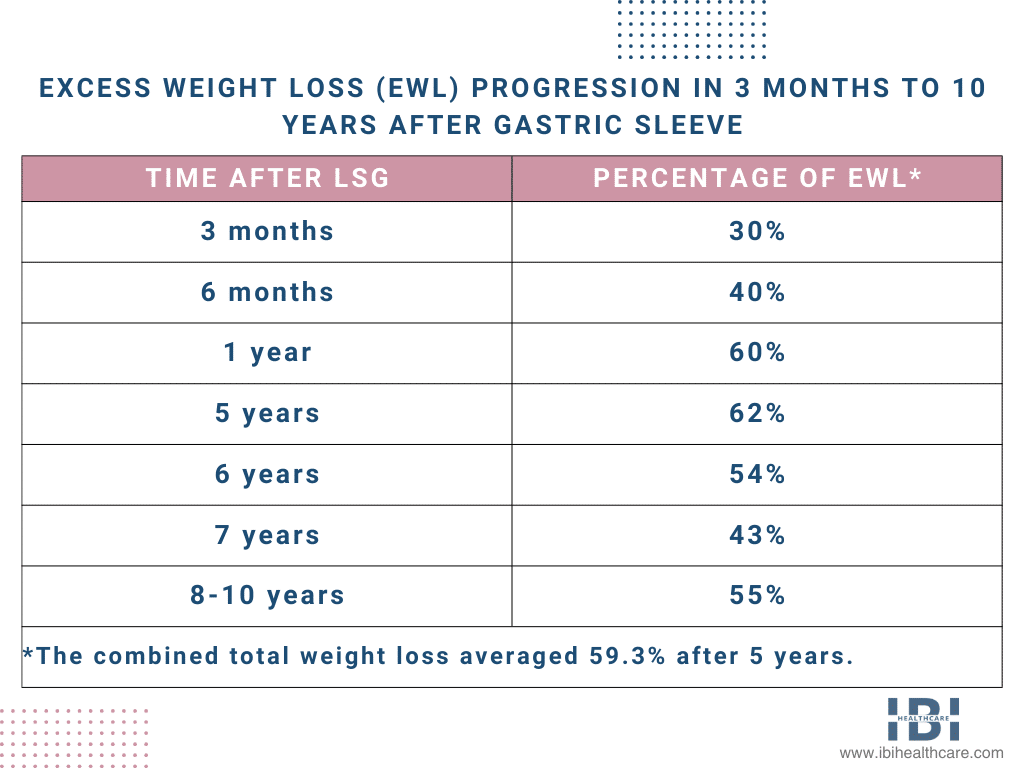If you have ever contemplated weight loss surgery you probably started researching to determine which procedure would be best for you. Most people find and compare before and after pictures of gastric sleeve and gastric bypass surgery patients and are amazed to see such dramatic weight loss results and the changes in the patient’s appearance.
If you have compared before and after gastric sleeve surgery galleries, did you ever wonder what was going on with that patient now? Were they able to keep the weight off? Did they lose more weight after that? It is perfectly natural to be curious about these questions, especially if you are contemplating undergoing gastric sleeve surgery. Let’s take a look at some long-term results and what you can expect from gastric sleeve surgery 10 years later.
How Do You Lose Weight With Gastric Sleeve Surgery?
Vertical Sleeve Gastrectomy (VSG) or Laparoscopic Sleeve Gastrectomy (LSG) is commonly referred to as gastric sleeve. It’s a type of bariatric surgery. Gastric sleeve surgery is an effective tool in promoting weight loss because it helps patients with some of the most challenging weight loss struggles.
- 1. Reduces stomach capacity and forces portion The procedure surgically removes about 70-75% of the patient’s stomach. The remaining portion of the stomach is sutured into a much smaller tube-like shape or a “sleeve” that can only hold about 5-6 ounces.
- 2. Delays gastric emptying smaller stomach pouch takes longer to process the food that is ingested so the satisfying feeling of being “full” lasts longer.
- 3. Quiets hunger pangs – The stomach produces what is referred to as the “hunger hormone” ghrelin. Removing a portion of the stomach reduces the amount of ghrelin manufactured and secreted into the body. The reduction of these hunger-inducing hormones helps decrease the patient’s appetite.
Gastric Surgery Offers Many Immediate And Long-term Benefits
Gastric sleeve surgery can help facilitate a significant loss of weight in one year when used properly and combined with a healthy low-calorie diet and plenty of exercise. The benefits of gastric sleeve surgery are numerous and include:
- Weight reduction.
- Reduced risk of stroke.
- Reduced risk of several types of cancer.
- Achieving a lower BMI (body mass Index).
- Remission of weight-related diseases including type II diabetes, hypertension, non-alcoholic fatty liver (NAFLD), cardiovascular Issues, and severe sleep apnea.
The most significant and fastest weight loss occurs during the first three months after bariatric surgery. A 2016 study determined that patients’ BMI level and comorbidity improvements 3 months after gastric sleeve surgery are good indicators of their long-term results.
Weight Loss Retention After Gastric Sleeve
Gastric sleeve surgery can help individuals lose a significant amount of weight. The most dramatic weight loss happens fairly quickly within the first 3 to 6 months after the surgery.
During the remainder of the first year, the patient may have to readjust their diet or exercise program because it is normal to hit plateaus and for weight loss to slow down. Most patients lose a significant amount of weight by the end of the first year but maintaining long-term results for 5, or even 10 years after gastric sleeve surgery will be more difficult.
Weight Loss Results Can Fluctuate Year Over Year After Gastric Sleeve
A study conducted regarding gastric sleeves and long-term weight loss reported that the percentage of excess weight loss changed over the years.
Excess weight is a term that describes the difference between the patient’s starting weight and goal weight. For example, if an individual weighs 250 pounds, and their goal weight (the weight that puts them at a healthy BMI level) is 150 pounds then that individual has 100 pounds of excess weight. If they lose 30 pounds, they have lost 30% of their excess weight.

Each patient will be different but it is very common to experience weight fluctuations long-term after weight loss surgery. According to researchers, it is considered favorable if a patient maintains at least a 50% EWL.
Weight Regain In The Years Following Gastric Sleeve Surgery
Many Patients gain weight after losing a significant amount immediately following VSG surgery. The majority of weight gain can usually be attributed to a lack of patient compliance in following a healthy lifestyle which includes diet and exercise.
Other factors can also cause situations of weight gain. The body’s natural metabolic system makes unsolicited adjustments to how fast or slow our body processes food and stores fat. When we lower our caloric intake, our body reacts by slowing down our metabolism so we do not starve.
Also, the smaller stomach that was created during the gastric sleeve procedure can eventually stretch out allowing the individual to gradually eat more and more until they are overeating and begin to gain weight. A non-surgical bariatric procedure can repair this, restore the smaller stomach size, and promote future weight loss.
Studies have shown that 13-30% of patients regain weight after gastric sleeve surgery and sometimes it can exceed their starting weight.
Tips For Maintaining Your Weight Loss Results for 10+ Years After Gastric Sleeve
Not everything is within your control when it comes to weight regain but you can take a proactive approach to lower the risk of it occurring.
- Permanent lifestyle modifications Early adoption and commitment to lifestyle changes that facilitate weight loss will have the most direct impact on weight maintenance.
- A strong support system having support and help from people in your immediate circle can help keep you motivated, successful, and on track with your weight loss goals.
- Open communication with the bariatric surgeon’s office your bariatric surgeon and their team close. They are on your side and want to help you with your weight loss journey. If you notice weight regain, set up a time to speak with them so they can figure out what is going on and how to best help you. You may be experiencing an issue that can be corrected with a non-surgical revision. Even if you know that you have not been following your plan, they will help get you back where you need to be.
Quality Of Life After Gastric Sleeve Surgery 10 Years Later
Patients who undergo gastric sleeve surgery enjoy several long-term quality-of-life improvements. One study reported improvements including:
- Sex life.
- Social life.
- Decrease in depression.
- Mobility & physical activity.
- Self-esteem & Self-confidence.
- The ability to find clothing to fit.
- Elimination or remission of weight-related illnesses such as type-two diabetes.
Another study reported not only similar findings to the one mentioned above but also improvements related to the patient’s relationship to food. Food was no longer a dominant force in their life. The improvements in their energy levels and physical ability became more important as did the healthier diet needed to maintain them.
Long-Term Complications After Gastric Sleeve Surgery
While the positive results of gastric sleeve surgery may outweigh the complications, these types of issues need to be considered when evaluating any weight loss surgery. Long-term complications can include:
- Gallstones.
- Acid reflux (common side effect).
- Nutrient deficiencies (not as common with gastric sleeve).
Less common but more serious:
- Hernias.
- Leakage.
- Bowel Obstruction.
Maintaining The Positive Impact Of The Procedure
We often hear of the numerous benefits undergoing gastric sleeve surgery offers, but there is not much information describing life after the gastric sleeve procedure. What can be expected from the gastric sleeve 10 years later?
Patients who have undergone bariatric surgery such as a gastric sleeve will have to work to maintain their results for the rest of their lives.
Maintaining the results of your gastric sleeve surgery will depend on many factors and finding the correct balance between these factors is key. Sometimes, long-term changes may include shifts in the patient’s social life or even friends. The most critical life-long adjustments are adhering to dietary requirements, an exercise program, and taking nutritional supplements.
What Will My Diet Look Like 10 Years After Gastric Sleeve?
Part of your lifestyle changes includes an ongoing diet of healthy foods eaten in the correct order. On the other hand, this diet is often called the phase-4 or stabilization diet. Additionally, this diet ensures adequate intake of protein, fat, and carbohydrates.
Following the stabilization diet will ensure that you are getting your nutritional needs met without promoting weight gain. Lastly, a traditional phase-4 diet after gastric sleeve includes protein, carbs, and fat.
Phase 4 Dietary Requirements After Gastric Sleeve Surgery
| Women | Men | |
|---|---|---|
| Carbohydrates | 30-60 grams | |
| Protein | 60 grams | 75 grams |
| Fat | 30 grams | |
Subsequently, focus on healthy foods that fall in each category and avoid refined sugar and processed foods. Nonetheless, follow the instructions provided by your bariatric surgeon on portion control to ensure the stomach is not stretched out. Although, meals should not exceed the smaller stomach size of 5-6 oz.
This diet begins approximately 4-6 months after the procedure and patients will still be following this phase 4 stabilization gastric sleeve diet 10 years later and for life.
Will I Still Need To Exercise Even 10 Years After?
Yes, to maintain your weight loss results and for the benefit of your overall health, you should continue to exercise for the rest of your life.
However, about six months after your surgery, you will be able to do any type of exercise you like. Indeed, you should have a schedule that you follow that includes at least 5 30-minute workouts in a week. Try to find activities that you enjoy, and add variety so it won’t be as challenging to stay motivated for 3, 5, or 10 years after your gastric sleeve surgery.
Life-Long Nutritional Supplements
Certainly, Gastric Sleeve Surgery does not require alterations to the digestive system. On the other hand, nutritional deficiencies are less of a concern. But after the surgery, your body must get what it needs from a smaller amount of food which is not always possible. Subsequently, your bariatric surgeon will recommend or prescribe vitamins or supplements for you to take to minimize the risk of nutritional deficiencies. Conversely, you will need to take these supplements for the rest of your life.
Gastric Sleeve Surgery Benefits Are Long-Term
Gastric sleeve surgery offers many benefits both in the short term and in the long term. However, maintaining the initial weight loss results after gastric sleeve surgery for 10 years or longer will require a full commitment to lifestyle changes regarding diet and exercise.
Furthermore, choosing an expert bariatric surgeon is the first step in ensuring long-term weight loss success. Consequently, contact IBI Healthcare Institute today. Learn more about how gastric sleeve surgery can help you lose weight and improve your health long-term.
In light of this, set up a consultation to discuss which weight loss procedure will be the best for you. Moreover, we are here to support you through the entire process and help you reach your weight loss goals.











